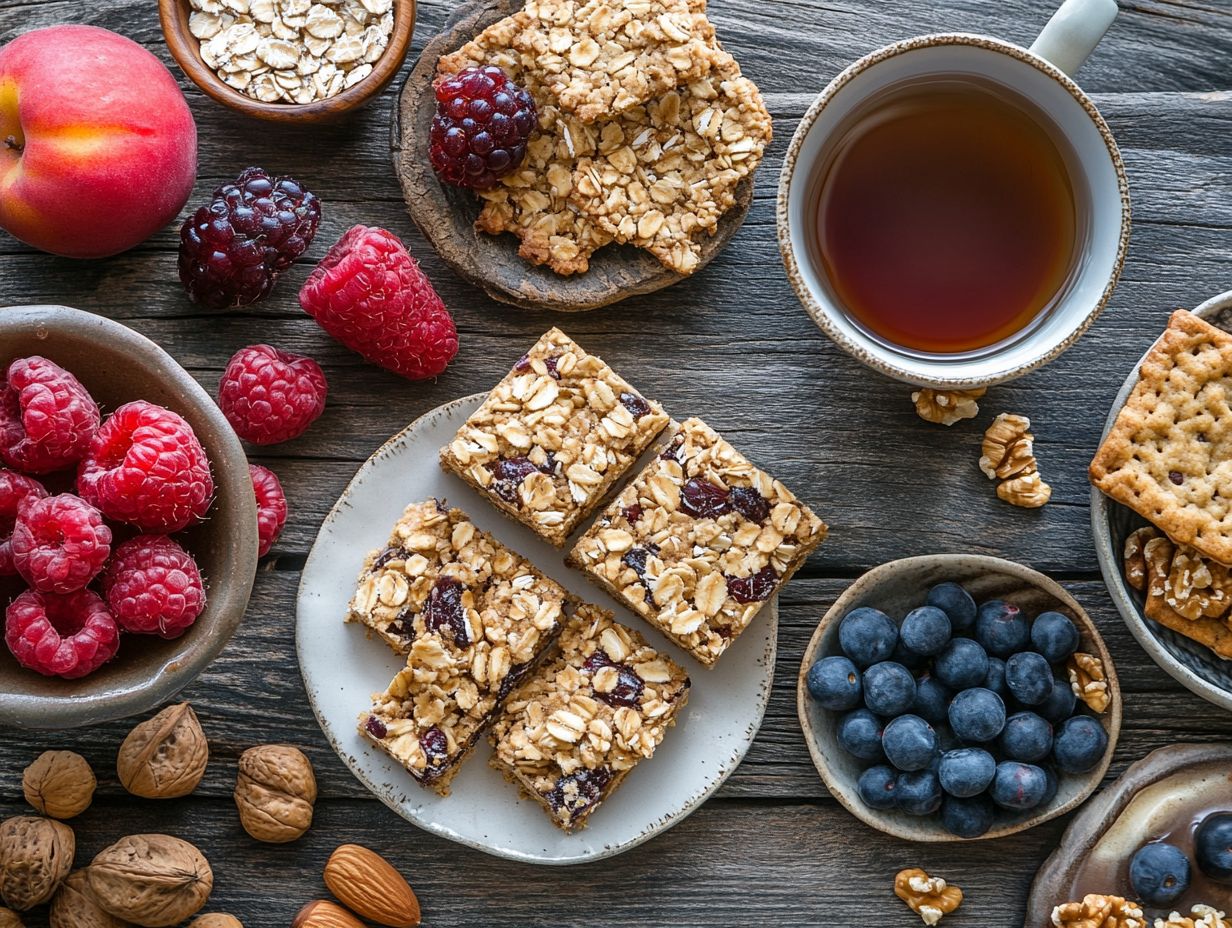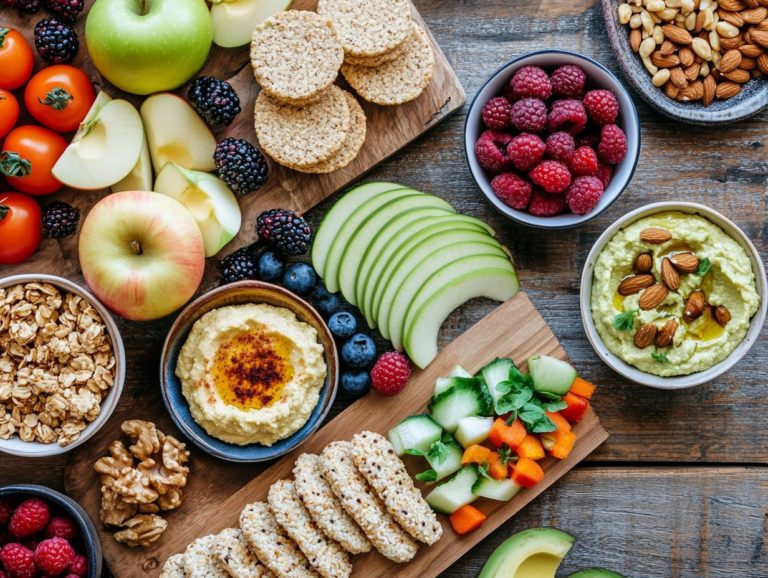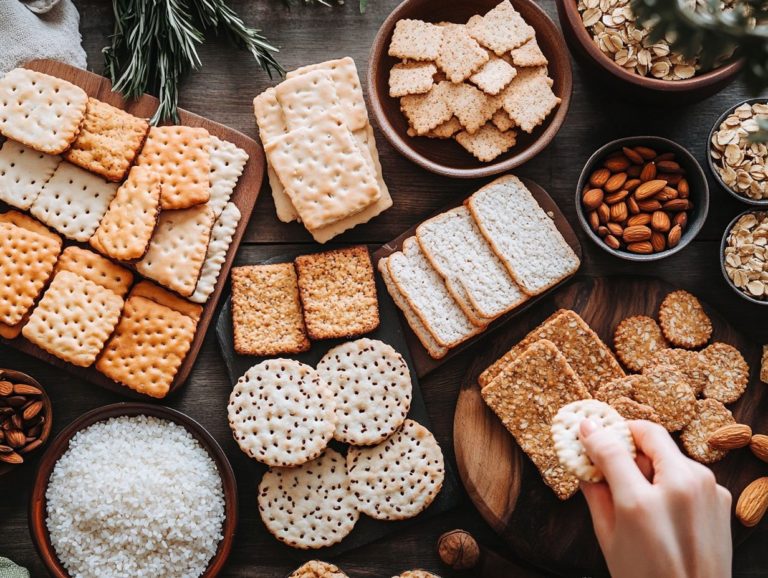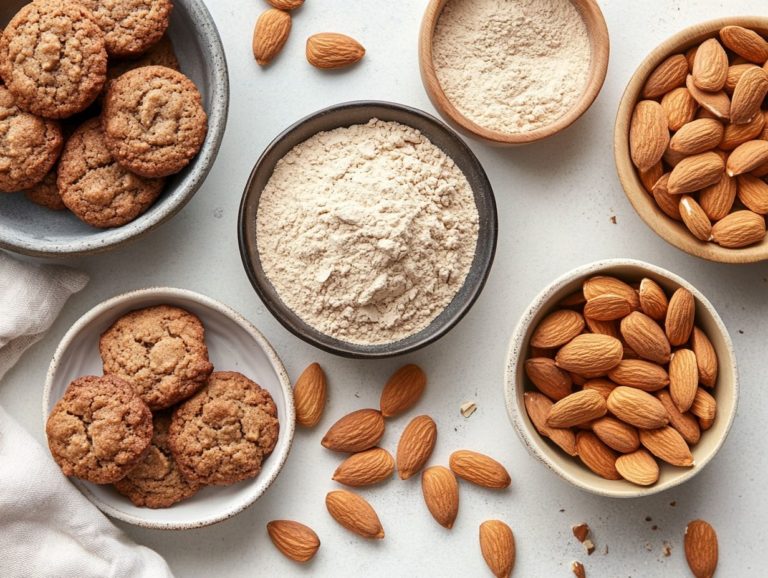Can Gluten-Free Snacks Be Made with Oats?
Contents
- The Role of Oats in a Gluten-Free Diet
The Role of Oats in a Gluten-Free Diet
Are you curious about whether oats can be part of your gluten-free journey? Let s explore! In a world that is increasingly conscious of dietary restrictions, gluten-free eating has risen to prominence, prompting a deeper examination of what gluten-free truly entails and how oats fit into this narrative.
While oats are often lauded for their numerous health benefits, you might find yourself questioning whether they can be safely incorporated into a gluten-free diet, especially if you have celiac disease or gluten sensitivity.
This article delves into the realm of gluten-free snacks, illuminating the role of oats, their advantages, potential risks, and a variety of delicious recipes you can try.
Explore alternative grains and flours, ensuring you can relish tasty, nutritious snacks without compromising your well-being. The inclusion of uncontaminated oats, certified by a gluten-free label, can make a significant difference.
Prepare to uncover everything you need to know about gluten-free snacking, including options for breakfast, baking, and more!
Key Takeaways:
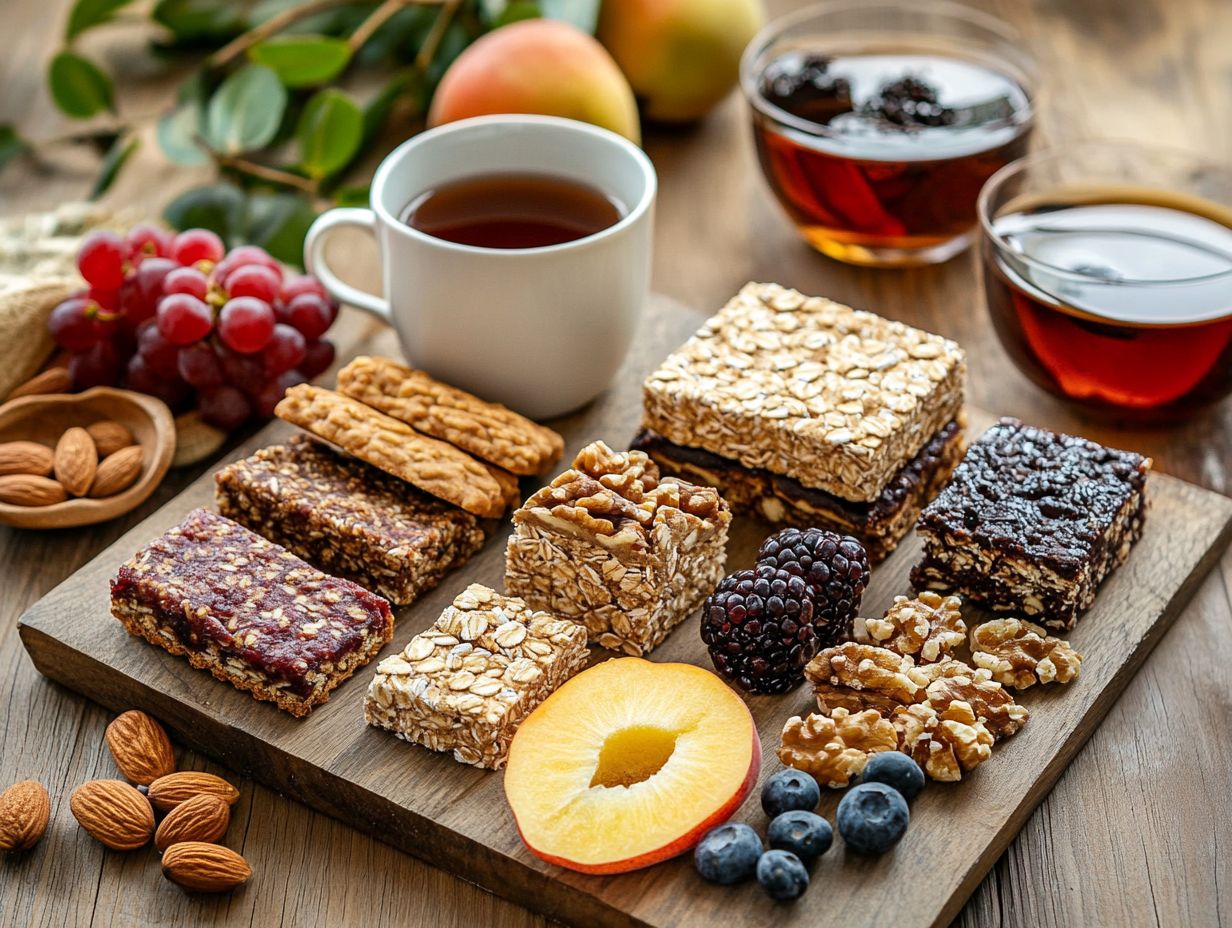
- Gluten-free snacks can be made with oats, but choose certified gluten-free oats to avoid cross-contamination.
- Oats are nutritious, high in fiber, protein, and antioxidants.
- Alternatives to oats include quinoa, amaranth, and almond flour, which provide variety for those with dietary restrictions.
What Is Gluten-Free?
Gluten-free means a dietary lifestyle that meticulously excludes gluten, a protein present in grains like wheat, barley, and rye. For individuals with celiac disease or gluten sensitivity, avoiding gluten is crucial, as its consumption can provoke adverse reactions and serious health risks.
Following a gluten-free diet is vital for maintaining your health and preventing complications linked to these conditions. The FDA has implemented stringent guidelines for labeling food products as gluten-free, enabling you to easily identify safe options that align with your dietary needs and contribute to your overall wellness.
What Are Oats?
Oats, scientifically recognized as Avena sativa, stand out as a beloved grain that provides a wealth of health benefits and serves as an exceptional source of nutrition. Rich in essential nutrients like protein, fiber, and vital minerals, oats are renowned for their ability to help lower cholesterol levels and enhance blood sugar control, making them an ideal choice for those managing diabetes.
Oats also contain avenin, a protein found in oats that is similar to gluten but is generally safe for those with gluten intolerance.
You ll find oats in various forms, such as oatmeal, oat flour, and granola, offering versatile and nutritious options that seamlessly fit into a gluten-free diet.
Are Oats Gluten-Free?
Oats are naturally gluten-free, but their safety for those with celiac disease and gluten sensitivity hinges on how they’re processed and the potential for cross-contamination with gluten-containing grains. To ensure your safety, it s essential to select uncontaminated oats that are specifically labeled as gluten-free. This label signifies that the oats have been processed in a way that prevents gluten exposure, making them a nutritious and suitable choice for anyone following a gluten-free diet.
The challenge arises because oats are frequently grown near gluten-containing grains like wheat, barley, and rye, which raises the risk of cross-contamination during harvesting and processing. Standard processing facilities often handle both gluten-free and gluten-containing products, increasing the chances of contamination. Choosing certified gluten-free oats is crucial for maintaining a gluten-free diet.
When shopping, keep an eye out for a recognizable gluten-free certification from reputable sources such as the FDA or AOAC International. This certification ensures that the oats have undergone rigorous testing and adhere to established safety standards. By being vigilant about these aspects, you can significantly enhance your well-being if you have gluten intolerance.
What Are the Benefits of Gluten-Free Snacks?
Gluten-free snacks present an array of health benefits, especially for those dealing with celiac disease or gluten sensitivity. They allow you to indulge in a variety of foods without experiencing the unfortunate side effects linked to gluten consumption.
By choosing these snacks, you can enhance your digestive health. They can also elevate your overall nutrition and ensure you receive the essential vitamins and minerals vital for maintaining a balanced diet. In incorporating gluten-free options into your routine, you promote a healthier lifestyle by reducing inflammation and supporting your weight management goals. Always remember to include a variety of ingredients to achieve a balanced intake of nutrients.
What Are the Risks of Gluten-Free Snacks?

Gluten-free snacks can be a fantastic choice for individuals with gluten-related disorders, but it’s essential to remain aware of some potential drawbacks.
Many gluten-free options can be surprisingly high in sugar and calories. If consumed in excess, these snacks may lead to weight gain and other health concerns. Being mindful of the nutritional content of these snacks is crucial, as some products may lack essential nutrients.
This can inadvertently lead to lacking important nutrients in your diet, particularly if gluten-containing foods are replaced without proper planning or guidance. It’s all about balance and making informed choices to ensure you get the nutrition you need.
Are Gluten-Free Snacks High in Sugar and Calories?
Many gluten-free snacks can surprise you with their unexpectedly high sugar and calorie content. This presents challenges if you’re striving to maintain a healthy diet. Manufacturers often compensate for the absence of gluten by adding sweeteners and fats to improve flavor and texture, resulting in products that may not align with your health goals.
This hidden aspect of gluten-free options can easily mislead you into believing that these snacks are inherently healthier. Always read labels carefully to avoid unhealthy surprises. Look for snacks with minimal added sugars, high fiber content, and nourishing ingredients.
It’s also crucial to consider portion sizes and choose products that provide a balance of nutrients rather than empty calories. By making informed choices and prioritizing whole foods like fruits, vegetables, and nuts, you can enjoy a balanced gluten-free diet without compromising your health or flavor. Popular studies by Healthline and the North American Society for the Study of Celiac Disease emphasize the importance of reading labels and being vigilant about the nutritional content of your snacks.
Can Gluten-Free Snacks Cause Nutrient Deficiencies?
Gluten-free snacks can inadvertently lead to lacking important nutrients if they aren t thoughtfully integrated into your diet, particularly for those with celiac disease who may already face challenges with nutrient absorption. Many gluten-free products fall short when it comes to fiber, vitamins, and minerals found in whole grains, making it essential for you to complement them with whole food sources.
To maintain a balanced nutrition profile while navigating a gluten-free diet, prioritize whole food sources such as fruits, vegetables, legumes, nuts, and seeds. These foods not only deliver essential nutrients but also promote your overall well-being, helping to stave off common deficiencies often linked to gluten-free snacking, like B vitamins and iron. Consulting with a dietitian can also provide tailored advice to ensure you re meeting all your nutritional needs.
By employing meal planning strategies that emphasize variety and moderation, you can further bolster your nutrient intake. By prioritizing wholesome options and being mindful of your snacking habits, you can enjoy your dietary preferences without compromising your health.
How Can Oats Be Used in Gluten-Free Snacks?
Oats can be your go-to ingredient for crafting versatile and nutritious gluten-free snacks. They provide a wealth of fiber, protein, and a delightful texture that elevates a variety of recipes.
Use them as the foundation for a warm bowl of oatmeal, blend them into homemade granola bars, or incorporate them into baked treats. Oats offer endless possibilities for creating delicious and healthful snacks that seamlessly fit your gluten-free lifestyle. Oat milk has also gained popularity as a nutritious and dairy-free alternative that complements a variety of recipes.
What Are Some Gluten-Free Oat Snack Recipes?
Creating gluten-free oat snacks is an enjoyable and rewarding endeavor. You can make a delightful variety of recipes such as oatmeal bars, granola clusters, and oat-based cookies. These treats not only satisfy cravings but also deliver essential nutrients, making them an excellent choice for those who prioritize wellness.
Whether you need a mid-morning pick-me-up or a post-workout indulgence, these oat snacks can easily integrate into your lifestyle. Picture oatmeal bars brimming with fruits like bananas and blueberries, providing a burst of flavor along with a generous dose of antioxidants. Granola clusters can be tailored with your favorite nuts and seeds, enriching your snacks with healthy fats and protein, while oat-based cookies can be naturally sweetened with honey or maple syrup.
These snacks are simple to whip up and promote digestion while sustaining your energy levels. They make a wholesome option that everyone can enjoy. Remember to consult your healthcare provider or dietitian before making significant changes to your diet.
What Are Some Alternatives to Oats in Gluten-Free Snacks?
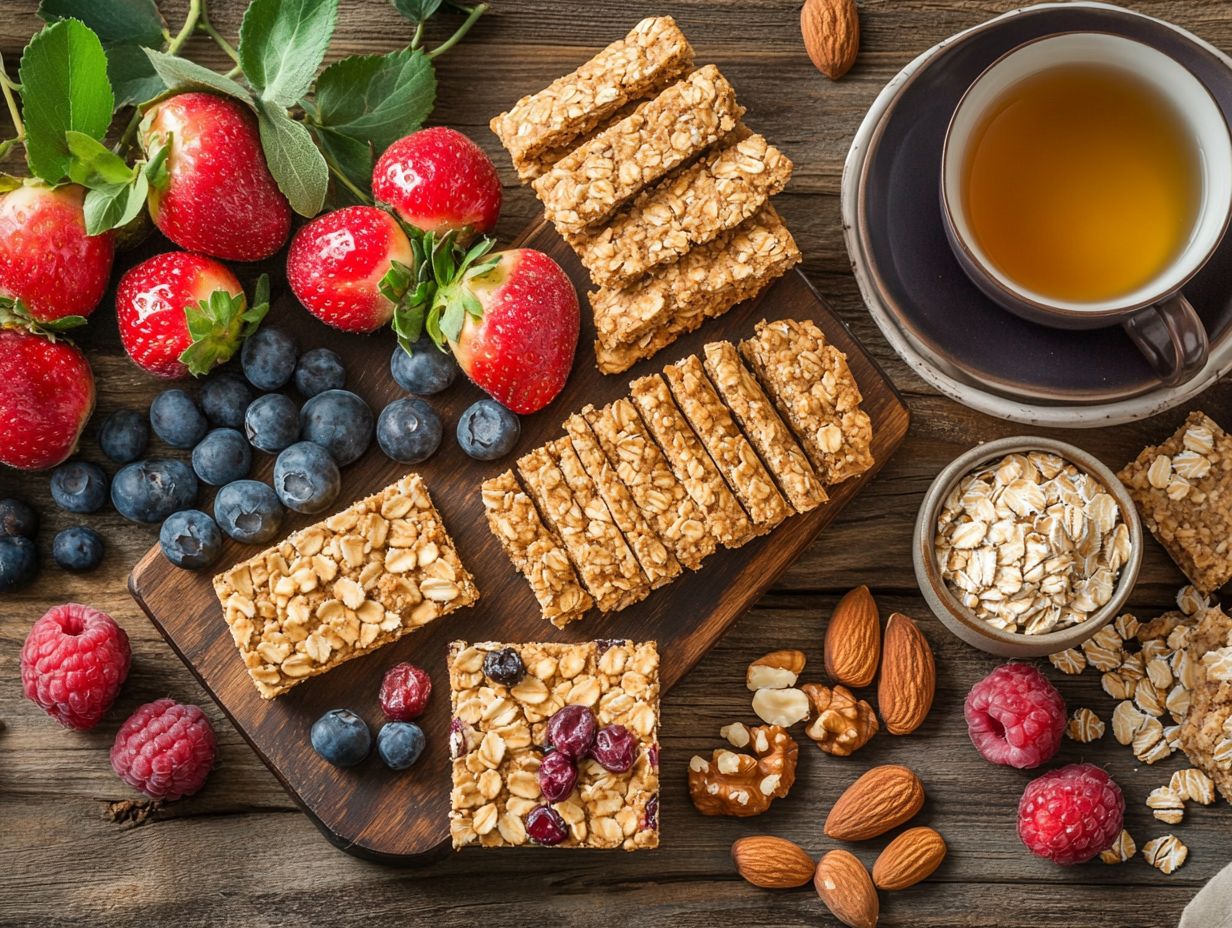
If you’re searching for exciting alternatives to oats in your gluten-free snacks, consider exploring a range of gluten-free grains and flours like quinoa, rice, and chickpea flour.
These ingredients not only enhance your cooking with delightful flavor and texture but also offer their unique nutritional advantages. This makes them exceptional choices for both gluten-free baking and cooking, elevating your dishes to a new level of deliciousness and healthfulness while supporting your weight loss and diabetes management goals.
What Are Some Gluten-Free Grains That Can Be Used Instead of Oats?
Explore the world of gluten-free grains that can serve as delightful alternatives to oats (Avena sativa), each presenting distinctive flavors and nutritional benefits. Quinoa, rice, millet, and buckwheat are among the top substitutes that seamlessly fit into various snack recipes, providing a wholesome option for those committed to a gluten-free lifestyle.
Take quinoa, for example; it shines with its high protein content and essential amino acids, making it an excellent choice for energizing breakfast bowls or as a healthful addition to your baking mixes. Millet, with its subtle flavor and remarkable versatility, can be easily ground into flour, making it ideal for creating gluten-free pancakes or muffins. These grains provide essential minerals and vitamins that are beneficial for overall health.
Meanwhile, buckwheat flour brings a delightful nutty flavor to the table, enhancing baked goods like cookies and bread while delivering a generous dose of fiber and antioxidants. Additionally, buckwheat can help manage cholesterol levels and supports weight loss efforts.
Incorporate these grains into your cooking by using them as foundational ingredients in granola bars, smoothies, or even as thickening agents in soups. This ensures you receive an added nutritional boost without compromising on taste. Consider using oat-based products like oat milk or oat flour for additional versatility in your recipes.
What Are Some Gluten-Free Flours That Can Be Used Instead of Oats?
Almond flour, coconut flour, and chickpea flour are great gluten-free substitutes for oats in a variety of recipes. Each flour offers unique flavors and nutritional benefits. These flours enhance the texture of your baked creations and infuse your gluten-free snacks with additional protein, fiber, and healthy fats. Products with a gluten-free label certified by organizations like AOAC International ensure safe consumption for individuals with gluten sensitivity or celiac disease.
Each of these alternatives has distinct characteristics. For instance, almond flour boasts a subtly sweet, nutty flavor and adds moisture, making it a perfect choice for cookies and cakes. In contrast, coconut flour is a moisture sponge that requires additional liquids in your recipes. Its light and airy texture can elevate your pancakes or muffins to delightful new heights. Meanwhile, chickpea flour, with its savory profile, is an excellent option for crafting breads or batters that could use a protein boost. Health experts from Healthline and the North American Society for the Study of Celiac Disease widely recommend these alternatives.
As you explore these flours, consider pairing them with gluten-free binders like xanthan gum or flaxseeds to achieve the perfect consistency in your baked goods. You’ll love the delicious results! These gluten-free options also cater to those who are gluten-intolerant or have gluten sensitivity, ensuring that you have safe and tasty alternatives at hand.
Frequently Asked Questions
Can Gluten-Free Snacks Be Made with Oats?
Yes, gluten-free snacks can be made with oats, provided they are certified gluten-free oats. This is crucial for those with gluten sensitivity or celiac disease to prevent any adverse reactions.
Are all oats gluten-free?
No, regular oats are not gluten-free. Only certified gluten-free oats are safe for individuals with celiac disease or gluten intolerance.
What makes certified gluten-free oats different from regular oats?
Certified gluten-free oats are grown and processed in dedicated gluten-free facilities, ensuring that there is no cross-contamination with gluten-containing grains. This certification is often regulated by organizations such as the FDA and AOAC International.
Can I make my own gluten-free oat flour at home?
Yes, you can make your own gluten-free oat flour at home by grinding certified gluten-free oats in a food processor or blender.
What are some common gluten-free snacks made with oats?
Some popular gluten-free snacks made with oats include oatmeal cookies, granola bars, energy bites, and oatcakes. These snacks are ideal for individuals on a gluten-free diet and can also contribute to better cholesterol management and overall health.
Are gluten-free oats suitable for everyone?
While certified gluten-free oats are safe for individuals with celiac disease or gluten intolerance, some people may still have an intolerance or sensitivity to oats. It is always best to consult with a healthcare professional before adding oats to your diet. Monitoring any potential reactions can help in assessing their suitability while aiming for remission of symptoms.

